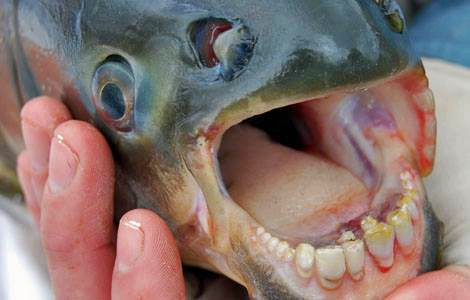
A fish with large humanoid teeth and a nasty reputation for biting men in the nether regions, has been discovered swimming wild in Michigan lakes, by anglers who have pulled in more than they bargained for.
The pacu fish, or tambaqui, which is a close cousin of the piranha, is native to the waters of the Amazon and Orinoco river basins in lowland Amazonia, South America, but it is also found in Papua New Guinea, where the species have been introduced and are now, rather worrying, known as ‘Ball Cutters’.
Pacus are fast-growing freshwater fish, which can get to almost a metre in length and reach weights of 23kg in the wild. Indiscriminate omnivores, their powerful molar-style teeth help them crunch through fruit, plants and, er, nuts.
In August 2013 the species was spied in Scandinavian waters, when an angler pulled a 21cm pacu from Øresund Sound off Sweden’s south coast, and another specimen was caught later the same month by someone fishing on the River Seine in Paris, prompting hysterical reports that the fish was staging a testicle-threatening invasion of European waterways.

Pacu’s presence in both American and European waters is blamed on irresponsible pet owners releasing the species into the wild because they quickly become too large for aquariums, something very much frowned upon by wildlife authorities because it’s cruel for the fish and dangerous for the environment.
‘Pets released from confined, artificial environments are poorly equipped to fend off predators and may be unable to successfully forage for food or find shelter,’ says Nick Popoff, manager of Michigan’s Department of Natural Resources’ Aquatic Species and Regulatory Affairs Unit. ‘Those that do succeed in the wild can spread exotic diseases to native animals. In the worst-case scenario, released animals can thrive and reproduce, upsetting natural ecosystems to the degree that these former pets become invasive species.’
But does the pacu really have a taste for testicles? Professor Peter Rask Moller, a professor at Copenhagen’s Museum of Natural History who issued warnings about this threat after the fish was found in Sweden, later admitted he’d been ‘half-joking’ when he told the press that the fish might mistake human genitalia for their favourite food of tree nuts.
‘We did say that we recommend men to keep their swimsuits tied up until we know if there are more pacus out there in our waters,’ he told CNN. ‘Of course, this is half a joke since it is very unlikely that you would actually meet one here and that it would bite you. It’s up to people themselves how careful they want to be. I’ll keep my shorts on, though.’
[geoip-content not_country=”CA”]
ON THE APP
Want to watch Wild Amazon—Part 1 for free right now? Subscribe to Love Nature and start your 30-day free trial of the best on-demand natural history documentaries out there.
[/geoip-content]



 Wild Amazon—Part 1
Wild Amazon—Part 1